教版(2019)选择性必修 第一册Unit 1 People of Achievement Grammar课件 (共22张PPT)
文档属性
| 名称 | 教版(2019)选择性必修 第一册Unit 1 People of Achievement Grammar课件 (共22张PPT) | 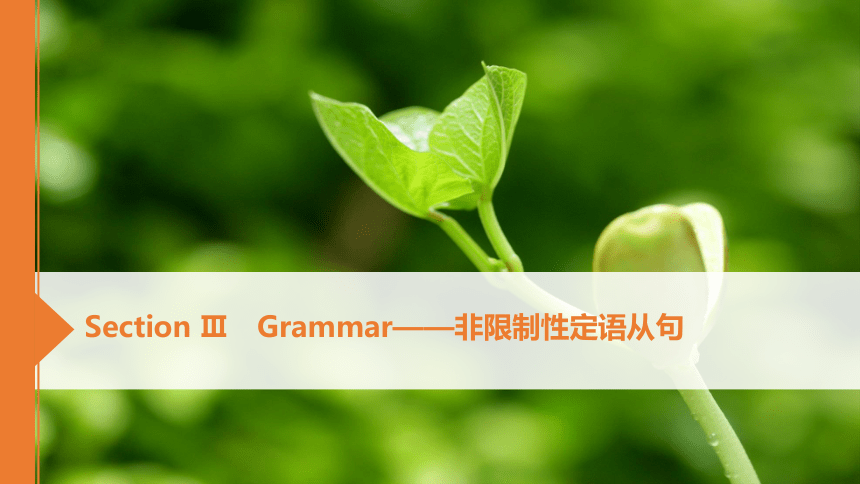 | |
| 格式 | pptx | ||
| 文件大小 | 2.4MB | ||
| 资源类型 | 教案 | ||
| 版本资源 | 人教版(2019) | ||
| 科目 | 英语 | ||
| 更新时间 | 2023-03-29 14:11:51 | ||
图片预览


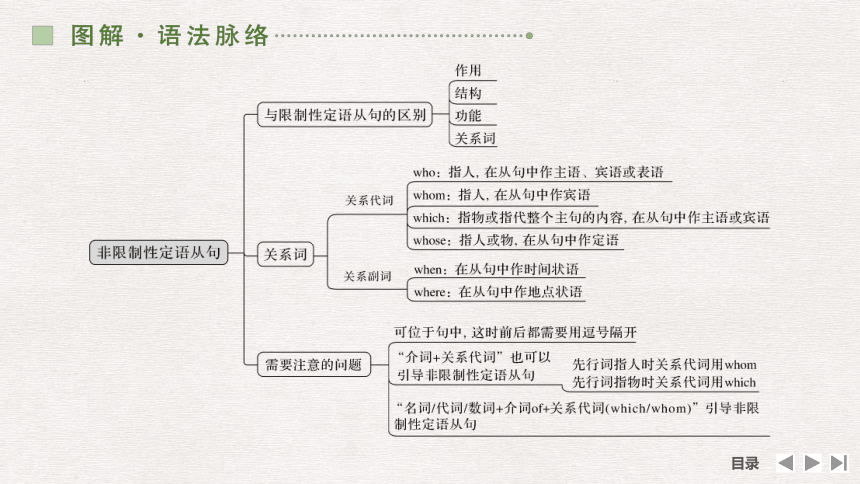
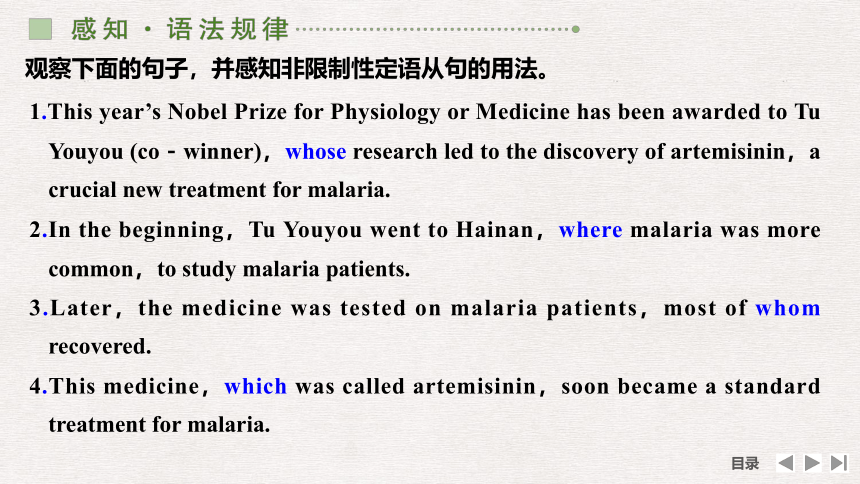
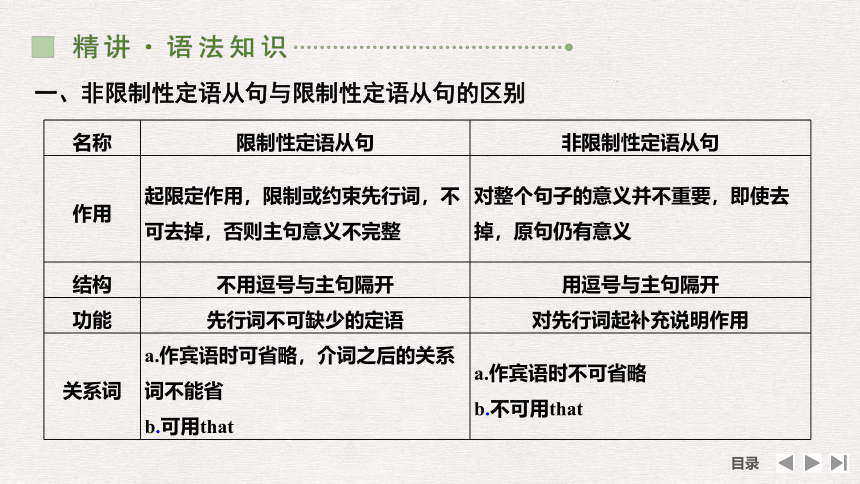

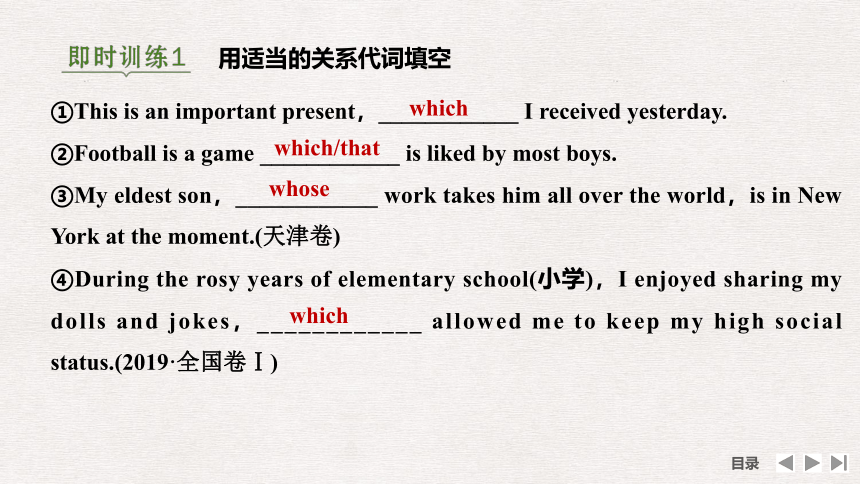
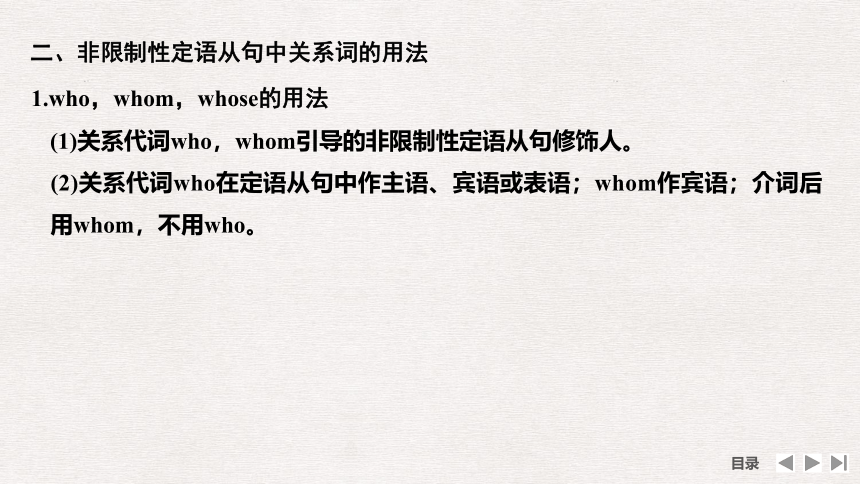
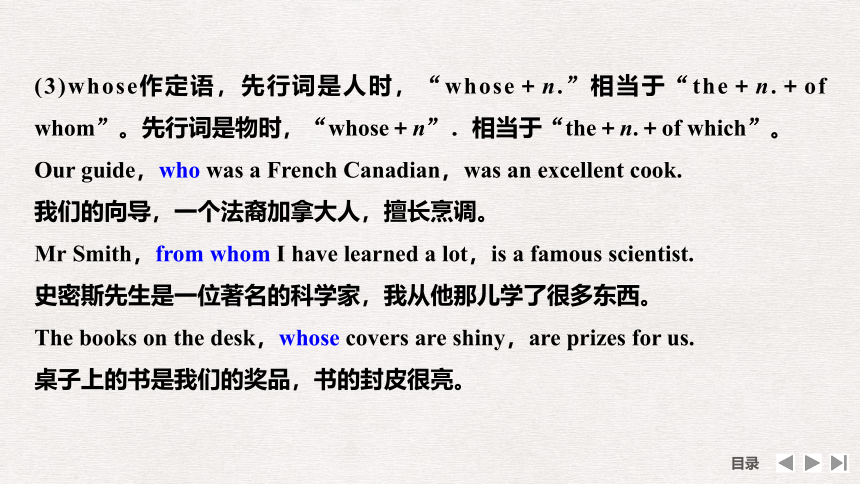
文档简介
(共22张PPT)
Section Ⅲ Grammar——非限制性定语从句
内 容 索 引
·感知·语法规律
·图解·语法脉络
·精讲·语法知识
观察下面的句子,并感知非限制性定语从句的用法。
1.This year’s Nobel Prize for Physiology or Medicine has been awarded to Tu Youyou (co-winner),whose research led to the discovery of artemisinin,a crucial new treatment for malaria.
2.In the beginning,Tu Youyou went to Hainan,where malaria was more common,to study malaria patients.
3.Later,the medicine was tested on malaria patients,most of whom recovered.
4.This medicine,which was called artemisinin,soon became a standard treatment for malaria.
一、非限制性定语从句与限制性定语从句的区别
名称 限制性定语从句 非限制性定语从句
作用 起限定作用,限制或约束先行词,不可去掉,否则主句意义不完整 对整个句子的意义并不重要,即使去掉,原句仍有意义
结构 不用逗号与主句隔开 用逗号与主句隔开
功能 先行词不可缺少的定语 对先行词起补充说明作用
关系词 a.作宾语时可省略,介词之后的关系词不能省 b.可用that a.作宾语时不可省略
b.不可用that
This is the fact that I have collected till now.
这就是我迄今收集到的事实。(限制性定语从句,先行词是the fact)
The novel,which I read last night,is very interesting.
那部小说,我昨晚读的那本,非常有趣。(非限制性定语从句,先行词是the novel)
The novel is very interesting,which makes me very glad.
这部小说很有意思,这让我很高兴。(非限制性定语从句,先行词是前面整句话)
①This is an important present,____________ I received yesterday.
②Football is a game ____________ is liked by most boys.
③My eldest son,____________ work takes him all over the world,is in New York at the moment.(天津卷)
④During the rosy years of elementary school(小学),I enjoyed sharing my dolls and jokes,____________ allowed me to keep my high social status.(2019·全国卷Ⅰ)
用适当的关系代词填空
which
which/that
whose
which
二、非限制性定语从句中关系词的用法
1.who,whom,whose的用法
(1)关系代词who,whom引导的非限制性定语从句修饰人。
(2)关系代词who在定语从句中作主语、宾语或表语;whom作宾语;介词后用whom,不用who。
(3)whose作定语,先行词是人时,“whose+n.”相当于“the+n.+of whom”。先行词是物时,“whose+n”.相当于“the+n.+of which”。
Our guide,who was a French Canadian,was an excellent cook.
我们的向导,一个法裔加拿大人,擅长烹调。
Mr Smith,from whom I have learned a lot,is a famous scientist.
史密斯先生是一位著名的科学家,我从他那儿学了很多东西。
The books on the desk,whose covers are shiny,are prizes for us.
桌子上的书是我们的奖品,书的封皮很亮。
①But Sarah,____________ has taken part in shows along with top models,wants to prove that she has brains as well as beauty.(全国卷Ⅲ)
②Peter,____________ you met in London,is now back in Paris.
③Isobel,____________ brother was training for the match,had heard the joke before.
④In 1963 the UN set up the World Food Programme,one of ____________ purposes is to relieve worldwide starvation.(江苏卷)
用who,whom和whose填空
who
whom
whose
whose
2.which,as的用法
(1)两者在定语从句中作主语或宾语。
Water,which is a clear liquid,has many uses.
水是一种清澈的液体,有许多用途。
Our country has sent up another man-made earth satellite,as is reported in the papers.
报纸上报道,我国又发射了一颗人造地球卫星。
(2)as,which引导非限制性定语从句的区别。
项目 as which
指代 引导的从句只能指代整个主句的内容 引导的从句既可指代整个主句的内容,又可指代主句的一部分
位置 可位于主句之前、之中或之后 引导的从句不能位于主句之前
意义 正如 这,那
I borrowed the book Sherlock Holmes from the library last week,which my classmates recommended to me.
我上周从图书馆借了《夏洛克·福尔摩斯》,这本书是我班同学推荐给我的。
The number of smokers,as is reported,has dropped by 17 percent in just one year.
正如所报道的那样,仅仅一年的时间,吸烟者的数量下降了17%。
①By boat is the only way to get here,____________ is how we arrived.
②____________ can be seen from his face,he is quite pleased.
③____________ you can imagine,the trip is no piece of cake.
用which和as填空
which
As
As
3.when,where的用法
(1)关系副词when在非限制性定语从句中作时间状语,指代主句中表示时间的词语。
(2)关系副词where在非限制性定语从句中作地点状语,指代主句中表示地点的词语。
(3)when/where有时可以换成“介词+which”。
We’ll put off the picnic in the park until next week,when the weather may be better.
我们打算把在公园里的这次野餐推迟到下周,那时天气可能会更好。
Opposite is St.Paul’s Church,where you can hear some lovely music.
对面是圣保罗教堂,在那里你能听到好听的音乐。
I left on Sunday,when/on which everyone was at home.
我是星期日离开的,当时人人都在家。
①He will travel abroad on May 1st,____________ he will be free.
②They went to London,____________ they lived for six months.
③Phytoplankton(浮游生物) live at the ocean surface,____________ they pull carbon dioxide(二氧化碳) into the ocean while giving off oxygen.
用适当的关系副词填空
when
where
where
4.“介词+关系代词”的用法
(1)在“介词+关系代词”中,关系代词用whom指人,用which指物。
He worked in a car factory for four years,after which he founded his own company in his hometown.
他在一家汽车厂工作了4年,之后在他的家乡建立了自己的公司。
We are short of two people,without whom we will need three more days to finish the work.
我们缺少两个人,没有他们,我们还需要三天的时间来完成这项工作。
(2)名词/代词/数词+of+whom和名词/代词/数词+of+which。
若用定语从句表示“所属”关系,先行词指人时,用“名词/代词/数词+of+whom”结构;先行词指物时,用“名词/代词/数词+of+which”结构,of前表示部分,of后表示整体。whose指物时,可用...of which代替。
The book contains 50 poems,most of which were written in the 1930’s.
这本书中有50首诗,大部分写于20世纪30年代。
There are two left,one of which is almost finished and the other of which is not quite.
还剩下两个,一个即将完成,另一个还远未完成。
The river whose banks are covered with trees flows to the sea.
→The river of which the banks are covered with trees flows to the sea.
→The river the banks of which are covered with trees flows to the sea.
这条两岸树木葱郁的河流向大海。
①She gave me two books,both of ________ I didn’t like.
②Lin-Manuel Miranda wrote this musical about Alexander Hamilton,____________ which the birth of America is presented as an immigrant story.
③Asia and the Pacific has perhaps 3,200 languages,____________ which Papua New Guinea alone accounts for well over 800.
单句语法填空
which
in
of
Thanks!
本节内容结束
Section Ⅲ Grammar——非限制性定语从句
内 容 索 引
·感知·语法规律
·图解·语法脉络
·精讲·语法知识
观察下面的句子,并感知非限制性定语从句的用法。
1.This year’s Nobel Prize for Physiology or Medicine has been awarded to Tu Youyou (co-winner),whose research led to the discovery of artemisinin,a crucial new treatment for malaria.
2.In the beginning,Tu Youyou went to Hainan,where malaria was more common,to study malaria patients.
3.Later,the medicine was tested on malaria patients,most of whom recovered.
4.This medicine,which was called artemisinin,soon became a standard treatment for malaria.
一、非限制性定语从句与限制性定语从句的区别
名称 限制性定语从句 非限制性定语从句
作用 起限定作用,限制或约束先行词,不可去掉,否则主句意义不完整 对整个句子的意义并不重要,即使去掉,原句仍有意义
结构 不用逗号与主句隔开 用逗号与主句隔开
功能 先行词不可缺少的定语 对先行词起补充说明作用
关系词 a.作宾语时可省略,介词之后的关系词不能省 b.可用that a.作宾语时不可省略
b.不可用that
This is the fact that I have collected till now.
这就是我迄今收集到的事实。(限制性定语从句,先行词是the fact)
The novel,which I read last night,is very interesting.
那部小说,我昨晚读的那本,非常有趣。(非限制性定语从句,先行词是the novel)
The novel is very interesting,which makes me very glad.
这部小说很有意思,这让我很高兴。(非限制性定语从句,先行词是前面整句话)
①This is an important present,____________ I received yesterday.
②Football is a game ____________ is liked by most boys.
③My eldest son,____________ work takes him all over the world,is in New York at the moment.(天津卷)
④During the rosy years of elementary school(小学),I enjoyed sharing my dolls and jokes,____________ allowed me to keep my high social status.(2019·全国卷Ⅰ)
用适当的关系代词填空
which
which/that
whose
which
二、非限制性定语从句中关系词的用法
1.who,whom,whose的用法
(1)关系代词who,whom引导的非限制性定语从句修饰人。
(2)关系代词who在定语从句中作主语、宾语或表语;whom作宾语;介词后用whom,不用who。
(3)whose作定语,先行词是人时,“whose+n.”相当于“the+n.+of whom”。先行词是物时,“whose+n”.相当于“the+n.+of which”。
Our guide,who was a French Canadian,was an excellent cook.
我们的向导,一个法裔加拿大人,擅长烹调。
Mr Smith,from whom I have learned a lot,is a famous scientist.
史密斯先生是一位著名的科学家,我从他那儿学了很多东西。
The books on the desk,whose covers are shiny,are prizes for us.
桌子上的书是我们的奖品,书的封皮很亮。
①But Sarah,____________ has taken part in shows along with top models,wants to prove that she has brains as well as beauty.(全国卷Ⅲ)
②Peter,____________ you met in London,is now back in Paris.
③Isobel,____________ brother was training for the match,had heard the joke before.
④In 1963 the UN set up the World Food Programme,one of ____________ purposes is to relieve worldwide starvation.(江苏卷)
用who,whom和whose填空
who
whom
whose
whose
2.which,as的用法
(1)两者在定语从句中作主语或宾语。
Water,which is a clear liquid,has many uses.
水是一种清澈的液体,有许多用途。
Our country has sent up another man-made earth satellite,as is reported in the papers.
报纸上报道,我国又发射了一颗人造地球卫星。
(2)as,which引导非限制性定语从句的区别。
项目 as which
指代 引导的从句只能指代整个主句的内容 引导的从句既可指代整个主句的内容,又可指代主句的一部分
位置 可位于主句之前、之中或之后 引导的从句不能位于主句之前
意义 正如 这,那
I borrowed the book Sherlock Holmes from the library last week,which my classmates recommended to me.
我上周从图书馆借了《夏洛克·福尔摩斯》,这本书是我班同学推荐给我的。
The number of smokers,as is reported,has dropped by 17 percent in just one year.
正如所报道的那样,仅仅一年的时间,吸烟者的数量下降了17%。
①By boat is the only way to get here,____________ is how we arrived.
②____________ can be seen from his face,he is quite pleased.
③____________ you can imagine,the trip is no piece of cake.
用which和as填空
which
As
As
3.when,where的用法
(1)关系副词when在非限制性定语从句中作时间状语,指代主句中表示时间的词语。
(2)关系副词where在非限制性定语从句中作地点状语,指代主句中表示地点的词语。
(3)when/where有时可以换成“介词+which”。
We’ll put off the picnic in the park until next week,when the weather may be better.
我们打算把在公园里的这次野餐推迟到下周,那时天气可能会更好。
Opposite is St.Paul’s Church,where you can hear some lovely music.
对面是圣保罗教堂,在那里你能听到好听的音乐。
I left on Sunday,when/on which everyone was at home.
我是星期日离开的,当时人人都在家。
①He will travel abroad on May 1st,____________ he will be free.
②They went to London,____________ they lived for six months.
③Phytoplankton(浮游生物) live at the ocean surface,____________ they pull carbon dioxide(二氧化碳) into the ocean while giving off oxygen.
用适当的关系副词填空
when
where
where
4.“介词+关系代词”的用法
(1)在“介词+关系代词”中,关系代词用whom指人,用which指物。
He worked in a car factory for four years,after which he founded his own company in his hometown.
他在一家汽车厂工作了4年,之后在他的家乡建立了自己的公司。
We are short of two people,without whom we will need three more days to finish the work.
我们缺少两个人,没有他们,我们还需要三天的时间来完成这项工作。
(2)名词/代词/数词+of+whom和名词/代词/数词+of+which。
若用定语从句表示“所属”关系,先行词指人时,用“名词/代词/数词+of+whom”结构;先行词指物时,用“名词/代词/数词+of+which”结构,of前表示部分,of后表示整体。whose指物时,可用...of which代替。
The book contains 50 poems,most of which were written in the 1930’s.
这本书中有50首诗,大部分写于20世纪30年代。
There are two left,one of which is almost finished and the other of which is not quite.
还剩下两个,一个即将完成,另一个还远未完成。
The river whose banks are covered with trees flows to the sea.
→The river of which the banks are covered with trees flows to the sea.
→The river the banks of which are covered with trees flows to the sea.
这条两岸树木葱郁的河流向大海。
①She gave me two books,both of ________ I didn’t like.
②Lin-Manuel Miranda wrote this musical about Alexander Hamilton,____________ which the birth of America is presented as an immigrant story.
③Asia and the Pacific has perhaps 3,200 languages,____________ which Papua New Guinea alone accounts for well over 800.
单句语法填空
which
in
of
Thanks!
本节内容结束
